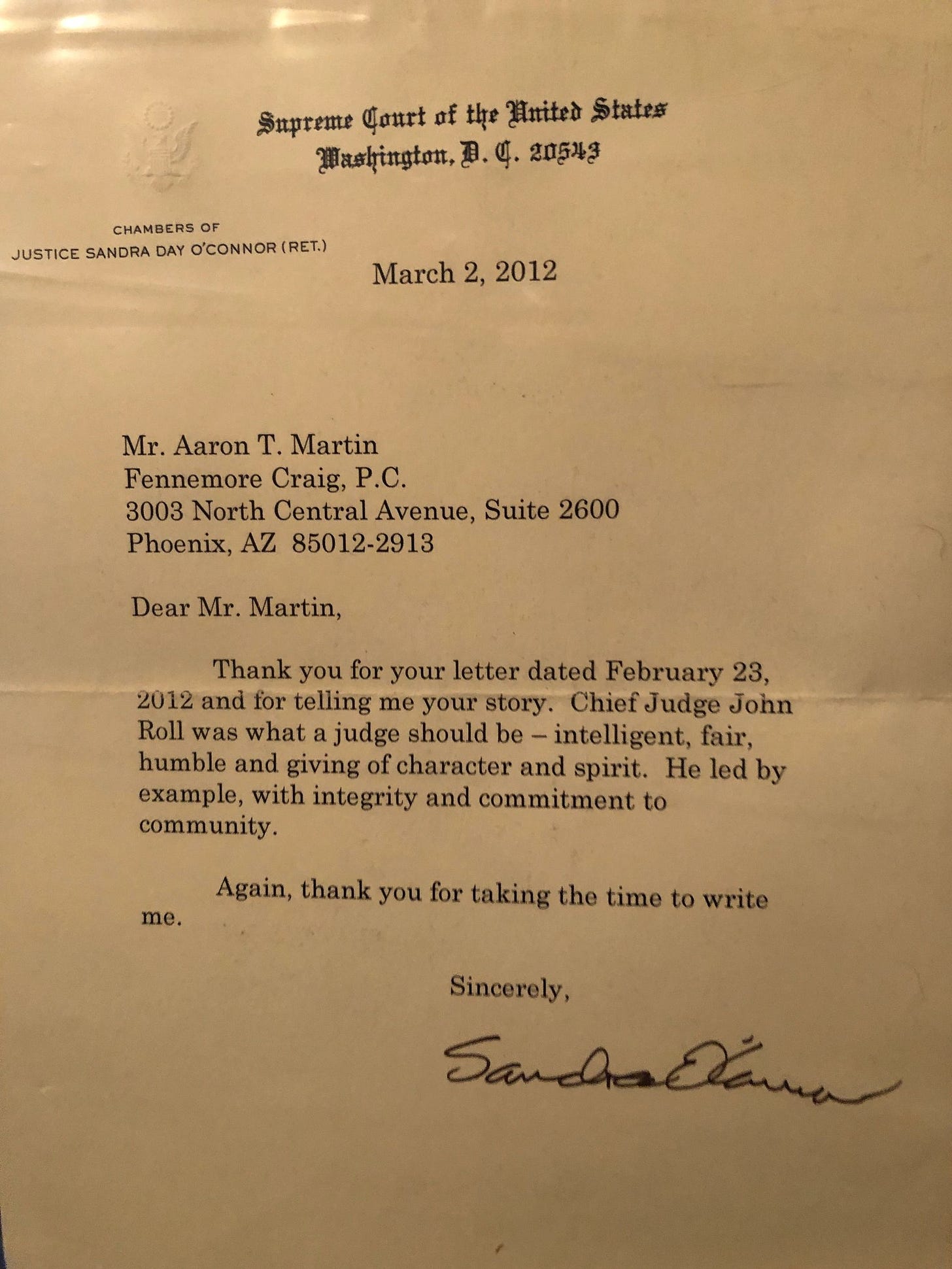Turn Every Page: Justice O'Connor and Building Consensus
Sandra Day O’Connor was a master at disagreeing without being disagreeable, and that’s a valuable lesson for all of us. Sometime around 2009, a few years after she retired from the Court, she taught a class at the University of Arizona with her former clerk and my professor, Ronnell Andersen Jones. One thing Justice O’Connor talked about was the importance of civility—in common interactions, for sure, but especially in intellectual discussions like what happens in a law school or a judge’s chambers.
I think her facility with building consensus and having civil, but sometimes difficult, conversations came from her time in the Arizona legislature. Legislatures are places where you need to work with others (ideally) to incorporate competing viewpoints and priorities into a single piece of legislation. One needs to be pragmatic. Pragmatism was one of Justice O’Connor’s guiding principles. After I asked her to sign my copy of her book, The Majesty of the Law (Random House, 2004), she asked whether I wanted her to add my name to the greeting. I said that I did. “Ok. I didn’t know if you were just going to sell it on eBay or something.” A pragmatist, both in law and in book-signing.
Love her or hate her, Justice O’Connor was a great example, in interacting with others, of learning to disagree without being disagreeable. And it’s a great lesson for those of us who work with others or have intellectual discussions of any kind. It does not help us seek the truth to be a bully or to be dismissive in discussions. In fact, such behavior is probably more often a sign of insecurity about your own position. You are unwilling to put your idea out there and let it stand on its own merits. Instead, you resort to ad hominem attacks or filibuster.
A few years ago, a potential client—an author—once called me about a potential “defamation” claim he thought he had against another author. The potential client had written a piece in a national publication. The other author challenged the potential client’s position in another national publication and noted that the potential client’s position had changed from his previously published works. This potential client was upset because when the other author highlighted the inconsistency of the potential client’s position, he thought it harmed his reputation. Maybe so, but I explained that this was not “defamation.” It was, rather, an intellectual debate that called for a response—that is, if the potential client was willing to address the fact that his position had, in fact, changed over time. Rather than address the issue, he wanted to go after the man and shut him up.
Great debates and discussions focus on issues and ideas, not the people proposing them. “Serving on the Court has provided me with a number of pleasant surprises. Some people think that the Court is full of bitter battles, and it is true that the Court’s opinions sometimes include strong language. But in fact one of my earliest and most rewarding experiences on the Court, and one that I did not fully anticipate, was of the warmth, kindness, and civility of my fellow Justices. Every one of my colleagues has been very thoughtful and considerate. There have been times with some previous Courts when some members did not get along and when some animosity persisted among certain Justices. Happily, that has not been the situation during my time here. It is a particular pleasure to be able to serve in an atmosphere of respect and affection for one’s colleagues.” (Majesty of the Law, 6)
For some reason, I felt compelled to write to Justice O’Connor in February 2012. After graduation from law school, I clerked for Chief Judge John Roll, who was killed in January 2011. After his death, I was tasked with packing up the books and personal effects in his chambers. One book on the shelf was O’Connor’s Majesty of the Law, and there was a note inside from Justice O’Connor to Judge Roll that he used as a bookmark. I forget exactly why I decided to write her, but I think I wrote simply to tell her how Judge Roll had apparently appreciated her note enough to keep it for many years afterward. She replied in early March (see image below).
Those traits—intelligence, fairness, humility, and generosity of character and spirit—are certainly traits Judge Roll had. But Justice O’Connor had them as well, and used them well as she became a master of how to work effectively with others.
Justice O’Connor’s background as a legislator certainly influenced her style as a judge. She often sought practical solutions to the country’s most pressing issues. Many people thought her approach to judicial decision-making was inappropriate, but few could doubt her devotion to the country and to the role she played on the Court. “If you don’t agree with all of the Court’s holdings, you are certainly not alone. But you may be confident that we never stop trying in our writings on every case on our agenda to contribute appropriately to the fragile balances of our national democracy.” (8)
“The fragile balances of our national democracy.” Imagine if we all recognized the fragile balances we must keep in equilibrium and acted accordingly in our discussions and debates with others. Although some people may take issue with Justice O’Connor’s opinions, let’s not mistake the ideas for the person. The moment we confuse the two, we stray from the search for truth into something else.
Remember to turn every page. Enjoy your weekend. Please let me know whether you need anything.
Best,
Aaron


